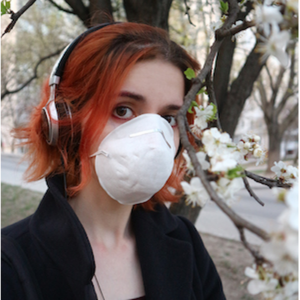 Ten Tips for Staying Mentally Resilient from a Returned Peace Corps Volunteer and Former Peace Corps Headquarters Staff Psychologist
Ten Tips for Staying Mentally Resilient from a Returned Peace Corps Volunteer and Former Peace Corps Headquarters Staff Psychologist
By Huong Diep
So you just landed back at your home of record (or HOR in Peace Corps acronym-speak — which might not even be the place you consider home anymore) after a grueling trip that you never planned on. Perhaps you oscillated between concern for your own health, the health of your family in the United States, and the health of the new family you created in your host country. Now that the adrenaline rush of having to pack up and say quick goodbyes (if you had the chance) is gone, and the “new norm” is starting to subside, allow me to share some words that may provide comfort and solace during these uncertain times.
1. Take a deep breath.
Many deep breaths. Breathe. This sounds so easy and trite, but it really is helpful. Taking longer belly breaths as compared to chest breathing will allow more oxygen into your brain and allow you to make decisions from a rational perspective as compared to activating the fight or flight response. Consider these apps: Insight Timer, Stop, Breathe & Think, Calm, and Headspace.
2. Own your experience.
No one will understand your experience and time with the Peace Corps. Whether it was two months or almost two years, you are amongst a small group of people who have served in the Peace Corps and this is the FIRST agency-wide evacuation. Recognize that your family and friends back at home may not understand your experiences — and that even among your cohort, some may not understand, either. In addition, if you identify as queer, a person of color, or any kind of “other,” please remember the intersectionality of all your identities and experiences will be helpful but also potentially complicate matters. When you’re ready, check out the RPCV portal, your local RPCV chapter, and the National Peace Corps Association Global Reentry Program to connect with others. It is important to be around others who speak the Peace Corps lingo so you don’t have to use precious brain space and bandwidth to explain what a SPA grant, DPT, readjustment allowance, and NCE all mean.*
3. Sloooooow down.
However, for those who are not particularly social and love alone time, it is important to recognize that it is OK to self-quarantine (both physically and mentally) alone, too. It’s OK if you want to slow down and go inwards and not connect with others at this time. A lot has happened — and if you find yourself retreating inward and not talking to others, it is more than all right. You are having a very normal reaction to an abnormal event. Some people may want to socialize and have virtual happy hours with other RPCVs. Others may prefer to continue messaging their communities via WhatsApp. Others may distance themselves. We are all trying to cope with numerous changes that are happening at the same time, so give yourself some grace and practice self-compassion.
4. Experience all the feels.
This is important because you will probably run the gamut of emotions. You may be angry that you had to leave your host country — or maybe you were secretly relieved that you had an “excuse” to leave (It’s OK! You’re not the only one!) Sadness, fear, guilt, and resentment are all normal to be experiencing right now. The secret is to feel the emotions instead of suppressing or avoiding or numbing them with drugs, alcohol, or eating all the chocolate in your quarantine pantry. By practicing mindfulness, the goal is to try not to judge your thoughts and feelings as good or bad, but just all a part of the human experience. Some folks may be able to identify with Kubler Ross stages of grief to describe this time as you may alternate between denial, anger, bargaining, depression, and acceptance. Remember, this is a tool to help identify potential feelings — but is not a linear timeline for grief.
5. Create a new routine.
Habits and routines are important and very powerful during this time because they create a sense of normalcy and safety. Your old routine has been immensely disrupted, so what can you do to create a new routine that includes some of your old routines? Based on the volunteers I have worked with and personal experience, creating new habits and routines that incorporated pieces of my “former” life helped adjusting tremendously. Examples including drinking coffee in a familiar mug/tin, making a comfort meal with basic ingredients that remind you of your host country, or playing music that you used to hear first thing in the morning while there. Some RPCVs chose to play the sound of a rooster waking them up in the morning, which was oddly familiar and comfortable!
6. Watch the story/narrative.
Our minds are constantly creating stories about our experiences and depending on our mood and perspective, sometimes the story is positive (e.g., “I did the best I could during the time I was there”) or negative (e.g., “I could have done more before I left”). While it may seem pretty hard to believe, your legacy is not your project. Most people will probably not remember what projects you did or the grant you got them; they will remember things that probably seem unimportant to you. In talking with hundreds of PCVs and RPCVs, they were surprised to hear that their lasting “legacy” was the time they stopped and had a conversation with someone, their laughter, and those moments when all language and cultural barriers dropped and they felt connected with another human being.
7. Move your body.
Exercise! I’m sure you heard this endlessly from your Peace Corps medical officer, and everyone talks about the power of exercise — but research has shown that exercise sends a powerful signal to your body that you are safe. Even throughout this quarantine, try to go for a walk and get some fresh air or do some planks and jumping jacks inside your apartment. Or even put out a mat and do some stretches on the floor with YouTube yoga. Crank up some of the music from your host country and do a solo dance party. Whatever it is, just move your body.
8. Gratitude.
Experts at University of Southern California’s NeuroImaging Lab say that humans have approximately 60,000 to 80,000 thoughts in a day, and about 80 percent of them are negative. I love how Rick Hanson Ph.D. (an expert on happiness) has described our brains as being like Teflon for positivity and Velcro for negativity. Therefore, if you find yourself easily going down a negative spiral, recognize that this is our negativity bias. Our brains were wired for survival, not happiness according to many mindfulness researchers. So what’s the trick? Focus on gratitude, even for the little things. Research has shown that keeping a gratitude journal and actually writing down what we are grateful for sends a message to your brain that “this is important, pay attention” and you will start to notice some of the positive aspects of your life.
9. Flex your (already) strong resiliency muscles.
Remember how strong you already are. Remember that not many people would sign up for what has been called “the toughest job you’ll ever love.” Remind yourself that you have many skills to offer both in the work and dating world. You will be able to find a job. You will be able to translate your experience into the “real world.” Remember, you learned how to live with a host family, you may have learned a new language, you learned how to navigate and code switch. I work from a strengths-based approach, so when clients come to me, I usually ask them, “What have you done in the past during challenging times that have helped you?” Oftentimes, my clients don’t realize the plethora of tools they have in their arsenal to support themselves during this challenging period.
10. Reach out for support.
Unfortunately, there is still an underlying stigma for seeking mental health support. I used to remind PCVs during my trainings that we all need support and we can use tools to add to our mental health toolkit — or sharpen tools we already have. The common response I hear is, “I used to think I could just talk to my friends/family about these things. I never knew how helpful it would be to talk to a professional.” If you are looking for mental health support in your area, I would suggest contacting your local RPCV chapter and NPCA to see if they work with local mental health providers that have been vetted in your community. Reach out. There are resources available and NPCA is working on lobbying for increased mental health support.
Thank you for your service and welcome to a group of nearly a quarter million of us that is here to support you and actually want to listen to your story. And we won’t be grossed out or tired of diarrhea anecdotes.
 Huong Diep, PsyD, ABPP is a licensed psychologist and international consultant based in Southern California. She has served as a Peace Corps Headquarters staff psychologist and as a Community Health Peace Corps Volunteer in the rural highlands of Peru from 2003–05 on a hand-washing and hygiene campaign with CARE Peru. Yes, the irony is not lost on her. Lavate, las manos.
Huong Diep, PsyD, ABPP is a licensed psychologist and international consultant based in Southern California. She has served as a Peace Corps Headquarters staff psychologist and as a Community Health Peace Corps Volunteer in the rural highlands of Peru from 2003–05 on a hand-washing and hygiene campaign with CARE Peru. Yes, the irony is not lost on her. Lavate, las manos.
*Small Project Assistance, Director of Programming and Training, and Non-Competitive Eligibility.